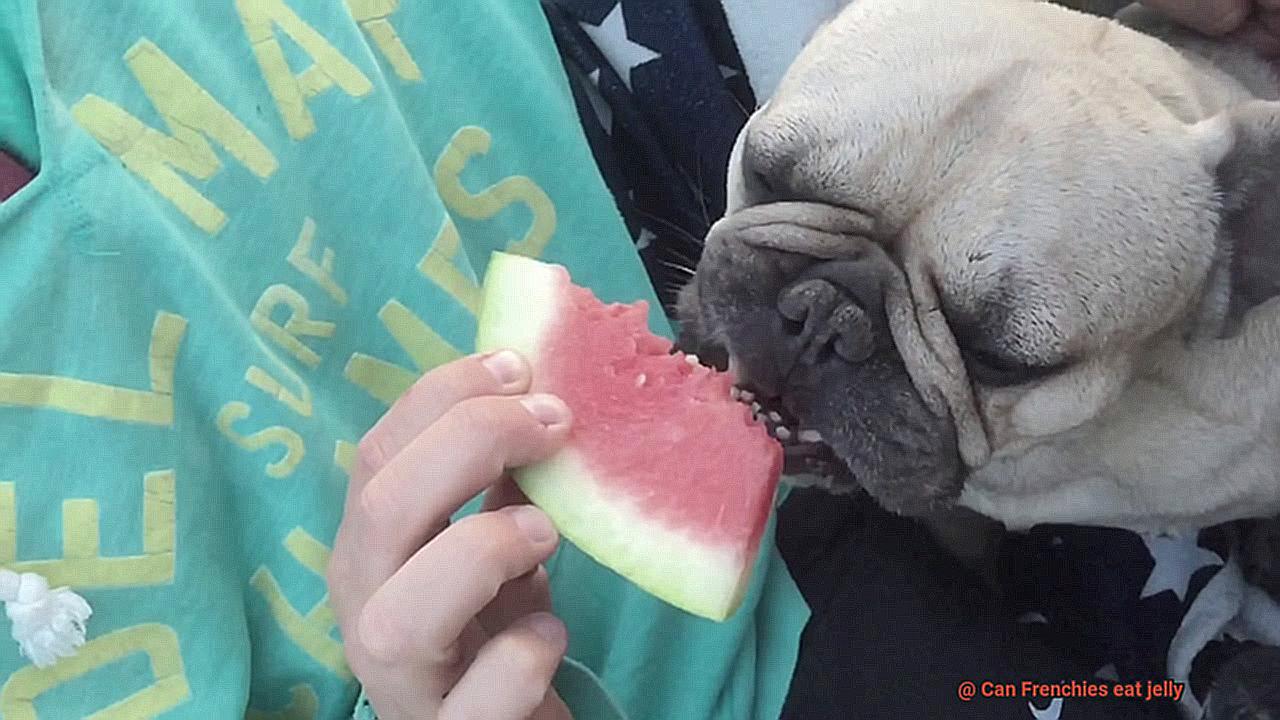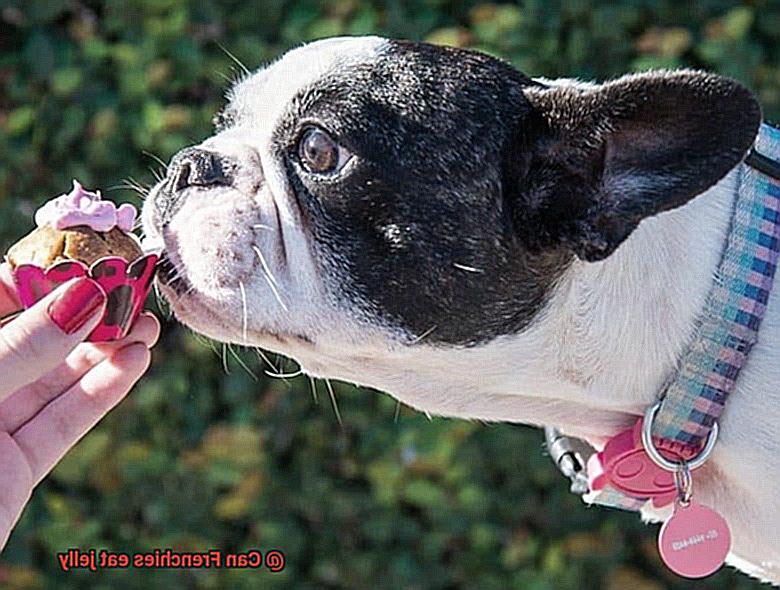Can Frenchies eat jelly?
We all know that Frenchies have a way of stealing our hearts with their adorable antics and unique looks. And as devoted dog owners, we’re always on the hunt for treats that will make our furry pals jump for joy. But here’s the million-dollar question that’s got everyone barking: Can Frenchies dig into some wiggly, jiggly jelly?
In this pawsitively awesome blog post, we’re about to uncover the truth behind this mouthwatering mystery. Get ready to dive deep into the world of pet nutrition as we separate fact from fiction and give you all the juicy details on whether or not our Frenchies can indulge in this wobbly wonder. So buckle up, folks. We’re embarking on a jell-rific adventure together to find out if jelly is a treat fit for our precious pooches. Let’s get started.
Nutritional Value of Jelly: Sugar, Fruit Juice, and Gelatin
Contents
- 1 Nutritional Value of Jelly: Sugar, Fruit Juice, and Gelatin
- 2 Potential Risks of Feeding Jelly to Frenchies
- 3 Benefits of Feeding Jelly to Frenchies
- 4 Moderation is Key When Feeding Jelly to Frenchies
- 5 Alternatives to Jelly for French Bulldogs
- 6 Is Low-Sugar or Sugar-Free Jelly Safe for Frenchies?
- 7 Can Dogs Eat Jello Safely?
- 8 What Types of Fruits Should Be Avoided in Jellies?
- 9 Conclusion
French bulldogs are known for their adorable appearance and playful nature. As a responsible pet owner, you want to ensure that your Frenchie is getting the right nutrition to support their health and well-being. This often leads to questions about what foods are safe for them to eat, including jelly. So, can French bulldogs eat jelly? Let’s take a closer look at the nutritional value of jelly and its potential benefits and drawbacks for your furry friend.
- Jelly is typically made from three main ingredients: sugar, fruit juice, and gelatin. These ingredients contribute to the taste, texture, and overall nutritional value of jelly. Let’s break it down:
- Sugar: Sugar is a major component of jelly and provides calories for energy. However, excessive consumption of sugar can lead to weight gain, dental issues, and other health problems in both humans and dogs. Frenchies, like all dogs, should consume sugar in moderation to avoid these potential risks.
- Fruit Juice: Fruit juice is often used to flavor jelly and add natural sweetness. Depending on the type of fruit used, fruit juice can provide some vitamins and minerals. However, it’s important to note that fruit juice also contains sugar and should be consumed in moderation. Additionally, certain fruits like grapes or raisins can be toxic to dogs and should never be included in jelly or any other food given to your Frenchie.
- Gelatin: Gelatin is derived from animal collagen and gives jelly its unique texture. It is primarily composed of protein and contains a small amount of essential amino acids. Protein is essential for muscle development and repair in dogs. While gelatin does offer some nutritional benefits, it may not provide all the necessary nutrients for a balanced diet. French bulldogs require a well-rounded diet that includes protein, carbohydrates, fats, vitamins, and minerals.
When it comes to feeding jelly to Frenchies, moderation is key. While a small amount of jelly as an occasional treat may not be harmful, it should not be a regular part of their diet. It’s important to prioritize a well-rounded and appropriate diet for your Frenchie’s overall health and well-being.
It’s also crucial to consider any specific dietary needs or health conditions your Frenchie may have. Some dogs may be allergic or sensitive to certain ingredients in jelly or may have underlying health issues that could be aggravated by consuming sugary foods. Consulting with a veterinarian is always recommended before introducing any new food into your dog’s diet, including jelly.
Potential Risks of Feeding Jelly to Frenchies

French Bulldogs are cherished family pets known for their playful nature and irresistible charm. As a responsible pet owner, it’s crucial to be aware of the potential risks associated with feeding certain foods to your Frenchie. In this article, we’ll delve into the world of jelly and explore why it may not be the best choice for your furry friend. Let’s uncover the sticky truth about feeding jelly to French Bulldogs.
Sugar Overload:

Jelly, with its delectable sweetness, can be a tempting treat for both humans and dogs alike. However, it’s essential to remember that French Bulldogs are prone to weight gain and obesity. Jelly is typically loaded with sugar, which can lead to unwanted pounds and potential health issues. Monitoring your Frenchie’s sugar intake is crucial to maintaining their overall well-being.
Digestive Upset:
Canine digestive systems differ from ours, making certain ingredients in jelly difficult for them to process. Artificial sweeteners or preservatives present in jelly may cause digestive upset, resulting in diarrhea, an upset stomach, or even more severe gastrointestinal issues. Opting for treats specifically formulated for dogs is a safer choice.
Toxic Ingredients:
Some types of jelly contain ingredients that are toxic to dogs. Grapes and raisins, for example, can cause severe health problems such as kidney failure in canines. It’s imperative to check labels and ensure that no harmful ingredients are present before offering any type of jelly to your French Bulldog.
Choking Hazard:
The gelatinous texture of jelly can be a choking hazard for small dogs like French Bulldogs. The sticky consistency can easily become lodged in their throat or cause blockages in their digestive system if not chewed properly. This potentially life-threatening situation may require immediate veterinary attention.
Dental Dilemmas:
French Bulldogs already face dental challenges due to their brachycephalic anatomy. Feeding them sugary treats like jelly can exacerbate these issues, promoting tooth decay and gum disease. To prioritize your Frenchie’s dental health, it’s best to steer clear of high-sugar foods like jelly.
Benefits of Feeding Jelly to Frenchies
As a proud owner of a French bulldog, you want the best for your furry friend. While you may have heard some concerns about feeding jelly to Frenchies, the truth is that when given in moderation and with proper consideration, jelly can actually have several benefits for your four-legged companion. Let’s dive into the sticky details.
Hydration Hero
Frenchies are notorious for their short snouts, which can make it challenging for them to regulate their body temperature. This can lead to dehydration, especially during hot summer months or after physical activity. Feeding jelly to your Frenchie can provide an extra boost of hydration since jelly is primarily made up of water. It’s like giving them a refreshing treat that helps quench their thirst.
Vitamins and Minerals Galore
Many jellies are made from fruits, which are packed with essential vitamins and minerals. By including jelly in your Frenchie’s diet, they can benefit from these nutrients that contribute to their overall health and wellbeing. However, not all jellies are created equal. Some may contain artificial flavors or preservatives that can be harmful to dogs. Opt for natural or homemade jellies that are free from any potentially harmful ingredients.
Tasty Treats for Tiny Tongues
Frenchies are known for their love of food, and giving them a small amount of jelly as an occasional treat can be a delightful experience for both of you. It adds a change in taste and texture to their regular diet, spicing up mealtime with some excitement. Just remember to practice moderation, as too much jelly can lead to weight gain or digestive issues.
Medication Made Easy

If your Frenchie requires medication, you know the struggle of getting them to take it. But fear not. Jelly can come to the rescue. The sweet and sticky nature of jelly can help disguise the taste and texture of medication, making it more palatable for your Frenchie. Simply hide the medication in a small amount of jelly, and watch them gobble it up without a fuss.
Mind-Stimulating Jelly Joy
Frenchies are intelligent little pups that thrive on mental stimulation. Incorporating jelly into puzzle toys or treat dispensers can provide a fun challenge for your Frenchie. Hide small amounts of jelly inside these toys, and let their natural instincts take over as they work to extract every last sweet morsel. It’s a win-win situation: mental stimulation and a tasty reward.
Remember, while jelly can have its benefits, it should always be given in moderation and as part of a balanced diet. It should not replace your Frenchie’s regular meals or be their primary source of nutrition. If you’re unsure whether jelly is suitable for your furry friend, consult with your veterinarian to ensure their safety and well-being.
Moderation is Key When Feeding Jelly to Frenchies
French Bulldogs are known for their adorable bat-like ears, wrinkled faces, and playful personalities. As a proud Frenchie owner, you want nothing but the best for your furry companion, including their diet. While it can be tempting to share every delicious treat with them, it’s important to remember that moderation is key when feeding jelly to French Bulldogs.
Sensitive Digestive Systems
French Bulldogs are notorious for their sensitive digestive systems. They are prone to gastrointestinal issues such as flatulence, diarrhea, and vomiting. This is why it’s crucial to carefully monitor their food intake and ensure they receive a balanced diet that meets their nutritional needs.
Ingredients in Jelly
Jelly is typically made from fruit juice, sugar, and gelatin. While fruit juice can provide some vitamins and minerals, it also contains natural sugars that can contribute to weight gain and dental problems if consumed excessively. Gelatin, derived from animal collagen, is generally safe for dogs in small amounts.
Occasional Treats Only
Jelly should only be given to French Bulldogs as an occasional treat rather than a regular part of their diet. It should never replace their balanced meals or essential nutrients. Too much sugar from jelly can lead to obesity, diabetes, and other health problems in Frenchies.
Moderate Consumption
To incorporate jelly into your Frenchie’s diet in a moderate manner, consider these guidelines:
- Tiny Training Treats: Use small amounts of jelly as a training reward. This allows your Frenchie to enjoy the taste without consuming excessive amounts.
- Mix with Regular Food: Add a small spoonful of jelly to your Frenchie’s regular food for added flavor. Be sure to monitor their reaction and any potential digestive issues after introducing jelly into their diet.
- Explore Healthy Alternatives: Instead of jelly, consider offering fresh fruits like blueberries, strawberries, and apples as a healthier sweet treat option. These fruits provide natural sugars along with vitamins and fiber. Additionally, frozen treats made from yogurt or pureed fruits can be a refreshing and healthier alternative to jelly.
Consult with Your Veterinarian
As a responsible pet owner, it’s always best to consult with your veterinarian before introducing any new food or treat into your Frenchie’s diet. They can provide guidance tailored to your Frenchie’s specific needs and health conditions.
Alternatives to Jelly for French Bulldogs
French Bulldogs, also known as “Frenchie,” are adorable and playful companions that bring joy to our lives. As responsible pet owners, it’s crucial to prioritize their health and well-being. While jelly may seem like a harmless treat, it’s important to understand that it may not be the best choice for our furry friends.
Why is jelly not recommended for French Bulldogs? Well, jelly is high in sugar and lacks nutritional value. Just like humans, French Bulldogs can suffer from weight gain and other health problems if they consume too much sugar. So, it’s best to explore healthier alternatives that provide essential nutrients to support their overall health.
Fresh Fruits: An Apple a Day Keeps the Vet Away.
Fresh fruits are not only delicious but also packed with vitamins and minerals that can benefit your Frenchie’s overall health. Consider offering them small portions of fruits like apples, bananas, and berries. These fruits are not only safe for French Bulldogs but also provide essential nutrients such as fiber, vitamins A and C, and antioxidants.
Natural Yogurt: A Probiotic Powerhouse.
Plain, unsweetened yogurt is a great alternative to jelly for French Bulldogs. It’s a good source of protein, calcium, and probiotics that support healthy digestion. Just make sure to avoid flavored yogurts that contain added sugars or artificial sweeteners, as these can be harmful to your furry friend.
Homemade Frozen Treats: Paws-itively Delicious.
Want to give your Frenchie a sweet treat without the unhealthy sugar content of jelly? Try making homemade frozen treats. Blend together dog-friendly fruits like watermelon or strawberries and freeze them in ice cube trays or silicone molds. These fruity popsicles are not only refreshing but also provide a nutritious snack for your furry friend.
High-Quality Commercial Dog Treats: Tail-Wagging Goodness.
If you prefer the convenience of store-bought treats, look for options specifically formulated for French Bulldogs. These treats are designed to meet their unique nutritional needs and are often made from high-quality ingredients. Avoid treats that contain artificial additives or excessive sugars, as these can have a negative impact on your Frenchie’s health.
Remember, providing your French Bulldog with a balanced diet is essential for their overall well-being. While jelly may seem like a fun treat, it’s best to opt for healthier alternatives that offer nutritional value without the negative effects of excessive sugar.

Is Low-Sugar or Sugar-Free Jelly Safe for Frenchies?
When it comes to treats, it’s crucial to choose wisely, considering the unique needs of our Frenchies.
Low-sugar or sugar-free jelly may seem like a tempting option for those looking to reduce their sugar intake or manage conditions like diabetes. However, it’s important to understand that what may be safe for us humans may not necessarily be safe for our furry friends.
French Bulldogs have sensitive digestive systems, and certain ingredients commonly found in low-sugar or sugar-free jelly can potentially harm them. Let’s take a closer look at why these jellies might not be the best choice for Frenchies:
- Artificial Sweeteners: One of the main concerns is artificial sweeteners like xylitol. Xylitol is commonly used in sugar-free products but is toxic to dogs. Even small amounts of xylitol can cause symptoms like vomiting, diarrhea, seizures, and even liver failure in our Frenchies.
- Carrageenan: Another ingredient often found in low-sugar or sugar-free jelly is carrageenan, a thickening agent derived from seaweed. While it is generally considered safe for humans, there is some evidence that suggests it may cause gastrointestinal inflammation in animals, including dogs.
To ensure your Frenchie’s safety, it’s essential to carefully read the ingredient list and consult with your veterinarian before offering any jelly or similar treats. Look out for hidden dangers like xylitol and carrageenan that could pose a risk to your furry friend’s health.
Even if a low-sugar or sugar-free jelly does not contain these harmful ingredients, it’s crucial to remember that moderation is key. Jelly is high in sugar and calories, which can contribute to weight gain and other health issues like diabetes and dental problems in French Bulldogs.
So, what are some safer alternatives to satisfy your Frenchie’s sweet tooth? Consider offering small amounts of fresh fruits that are safe for dogs, such as blueberries, strawberries, and watermelon. These natural treats provide essential vitamins and minerals while keeping their taste buds happy.
You can also explore options like natural yogurt, which is a good source of probiotics and protein. Just make sure to choose plain yogurt without any added sugars or artificial sweeteners.
If you prefer store-bought treats, opt for high-quality commercial dog treats specifically designed for French Bulldogs. These treats are formulated to meet their nutritional needs and often come in a variety of flavors to keep them entertained.
Remember, it’s always best to consult with your veterinarian to ensure that the treats you choose align with your Frenchie’s specific dietary requirements.
Can Dogs Eat Jello Safely?
French Bulldogs are known for their adorable squishy faces and playful personalities. As a loving Frenchie owner, you want to treat your furry friend to delicious snacks, but it’s essential to consider their dietary needs and potential health risks. One popular dessert that may catch your eye is Jello. But can French Bulldogs safely eat Jello? Let’s dive into this gelatinous topic.
Gelatin Goodness:
The primary ingredient in Jello is gelatin, derived from animal collagen. Gelatin provides some protein and can be beneficial for dogs. So, in moderation, Jello can be a tasty and nutritious treat for your Frenchie.
Sweetness and Safety:
When it comes to Jello, the devil is in the details. Some flavored varieties may contain artificial sweeteners like xylitol, which is toxic to dogs. So, always read the ingredients label carefully before offering Jello to your furry friend. Stick to plain or unflavored gelatin if you’re unsure about the ingredients.
Sugar Rush:
While a small amount of sugar may not harm your Frenchie, excessive consumption can lead to weight gain, dental issues, and even diabetes in dogs. Be mindful of the high sugar content in Jello and keep it as an occasional snack.
Mysterious Additives:
Certain Jello flavors may contain additives and artificial colors that could upset your Frenchie’s stomach or cause allergic reactions. To play it safe, opt for plain gelatin or consult with your vet if you’re uncertain about specific ingredients.
Consulting Your Veterinarian:
Before introducing any new food into your Frenchie’s diet, it’s always best to consult with your veterinarian. They can provide personalized advice based on your dog’s specific needs and health conditions.
Moderation is Key:
If you decide to treat your Frenchie to some Jello goodness, do so in moderation. A small amount as an occasional snack should not pose significant health risks. Remember, variety is the spice of life, so mix it up with other dog-friendly treats like fresh fruits or natural yogurt.
Monitor and React:
As with any new food, it’s crucial to introduce Jello gradually and monitor your Frenchie’s reaction. If you notice any signs of digestive upset or allergic reactions, discontinue feeding Jello immediately and consult your vet.
What Types of Fruits Should Be Avoided in Jellies?
French Bulldogs are adorable and playful companions known for their unique personalities. As a dog owner, it’s natural to want to share delicious treats with your furry friend, but it’s essential to consider their dietary needs and safety. One common question that many dog owners have is whether French Bulldogs can eat jelly and if it is safe for them.
Nutritional Value of Jelly:
Jelly is a sweet treat made from fruit juice, sugar, and gelatin. While it may be tempting to share a spoonful of jelly with your Frenchie, it’s crucial to understand the nutritional content of this popular dessert. Most jellies contain high amounts of sugar, which can lead to weight gain, dental issues, and even diabetes in dogs. Therefore, it’s essential to be mindful of the sugar content when considering feeding jelly to your French Bulldog.
Potential Risks of Feeding Jelly:
Certain fruits used in jelly can be harmful or toxic to dogs. Grapes and raisins, for example, are highly toxic to French Bulldogs and can cause kidney failure, even in small amounts. It’s important to avoid using grapes or raisins in any form of jelly you give to your Frenchie. Artificial sweeteners like xylitol, often found in sugar-free jellies, should also be avoided as they can be highly toxic to dogs.
Benefits of Feeding Jelly:
While there are potential risks associated with feeding jelly to French Bulldogs, small amounts may not necessarily harm them. Some jellies contain natural fruit flavors that can provide a source of vitamins and antioxidants for your Frenchie. Additionally, the gelatin found in jelly might have potential benefits for joint health and digestion in dogs.
Moderation is Key:
As with any human food given to dogs, moderation is key when it comes to feeding jelly to French Bulldogs. It’s important to consult with your veterinarian before introducing jelly into your Frenchie’s diet. They can provide personalized advice based on your dog’s specific dietary needs and health conditions. It’s best to offer small amounts of jelly as an occasional treat rather than a regular part of their diet.
Alternatives to Jelly:
If you’re looking for healthier alternatives to jelly, there are plenty of dog-friendly treats available in the market that are specifically formulated for French Bulldogs. Fresh fruits like apples or blueberries can also be a safe and tasty option for your Frenchie. Just remember to remove any seeds or pits that may pose a choking hazard.
Conclusion
In conclusion, Frenchies can indeed enjoy jelly as an occasional treat.
However, it is important to take certain precautions and consider their individual dietary needs. While some Frenchies may have no issues digesting small amounts of jelly, others may experience digestive discomfort or even allergies.
Therefore, it is crucial to consult with a veterinarian before introducing jelly into your Frenchie’s diet. Additionally, always opt for natural and sugar-free jelly options to avoid any potential harm caused by artificial additives or excessive sugar intake.
Remember, moderation is key when it comes to treating your furry friend.




